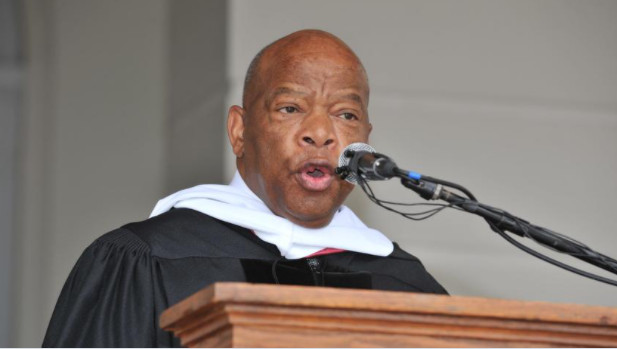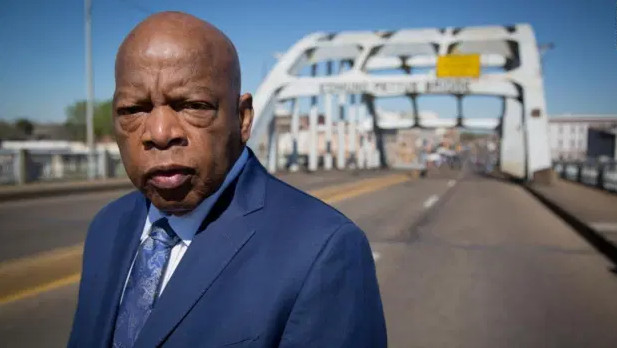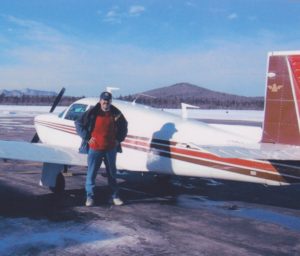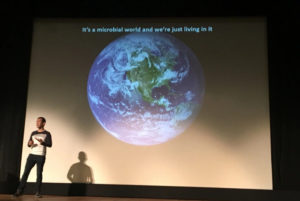The Daily Gazette newspaper in Schenectady, N.Y. published a column I wrote, recalling my meeting with John Lewis in 2013 and reflecting on his career in the wake of his passing. He was a guiding light for me, and he will be missed.
GUEST COLUMN: A brush with greatness: John Lewis was a guiding light
Late civil rights leader shared his wisdom
July 29, 2020

For The Daily Gazette
When civil rights icon John Lewis died July 17, I couldn’t help but think about how the flow of time relentlessly severs links with the past.
Congressman Lewis was the last living speaker from Dr. Martin Luther King Jr.’s famous march on Washington and his “I Have a Dream” speech.
A young man of 23 and already an ardent civil rights activist and follower of Dr. King, Lewis was the youngest person to speak on the steps of the Lincoln Monument on Aug. 28, 1963.
For him, it was an important stride forward in a long career of fighting for civil rights and against voter suppression and racism.
I was far too young at the time to understand the significance of that event.
I learned more about it during my studies at the University of Massachusetts Amherst.
My eyes were opened up then to the plight of Black Americans through the writings of author James Baldwin, the courageous works of Dr. King, and the leadership of Presidents John F. Kennedy and Lyndon Baines Johnson, and U.S. Attorney General Robert F. Kennedy.
Sadly, the younger Kennedy was assassinated while running for president in 1968, a mere two months after King was murdered in Memphis.
I was old enough in 1968 to grasp the crippling blow both assassinations dealt to the civil rights movement.
As the Vietnam War and the turbulent 1960s wore on into the 1970s of my college days I was left without someone who could provide me with vision and hope for the future.
Later, Lewis became one of those guiding lights for me.
I had the good fortune to meet Lewis and talk with him much later.
He came to the Capital Region in 2013 to deliver a commencement address at RPI, where I worked in press relations at the time.
Matt Ryan, then the leader and anchor of the WMHT-TV news program New York Now, knew a good story when he saw it.
He asked about coming in to interview Lewis.
Entering the conference room in the RPI library where I sat with Matt waiting to do the interview, Lewis walked a little slower than he did during his decades as a civil rights lion.
He was slightly stooped over but he greeted us warmly, took a seat across from Matt, leaned forward and got right into the interview.
Dressed in a dark-blue suit and white shirt adorned with a blue tie, he locked eyes with his interviewer and spoke softly yet firmly.
His dark eyes and often piercing gaze never strayed far from the questioner.
Lewis made us feel that nothing else in the world was happening for him that day.
His only focus was listening to Matt, answering questions, and regaling us with stories of his long career—during which he often suffered serious, life-threatening physical attacks.
I’ve long forgotten much of the interview (It’s still posted online at: https://video.wmht.org/video/new-york-now-civil-rights-pioneer-john-lewis/)
I distinctly recall three points Lewis made.
STUDY THE PEACE MAKERS
First, he studied those who preached non-violence as a core strategy for activists.
He studied Gandhi and others to adopt non-violence and passive resistance as the most effective means to effect change.
Peace and love, he said, were at the very core of his being.
FIGHT VOTER SUPPRESSION
Second, he was emphatic about finding ways to battle voter suppression, especially those efforts targeting minorities.
It was about as close as he came to anger during the interview.
Registering to vote and casting a vote, he said, “should be as easy as getting a drink of water.”
JOY AND SORROW
Finally, he was asked about the first Black person to be elected president: Barack Obama.
Lewis didn’t miss a beat.
“I cried,” he said, and “then I cried some more.”
They were tears of joy for witnessing an event he never thought he’d live to see, Lewis explained.
But they were also tears of deep sorrow for the fallen leaders—JFK, Dr. King, RFK, and others—who didn’t get to live to see that moment in late 2008.
While Lewis’ passing does break one last significant link to that history-changing march in 1963, he inspired me and thousands of others to help continue what the distinguished congressman, his compatriots, visionary leaders and so many others going back to the beginning of our republic started.
I am reminded of the words of fiery Boston-based abolitionist William Lloyd Garrison who said near the end of a mid-19th century essay on slavery:
”I am in earnest, I will not equivocate, I will not excuse, I will not retreat a single inch. I will be heard.”
I think of John Lewis when I read those words.
He never gave up, and neither should we.
Mark Marchand is a writer and adjunct professor in the Journalism Program at the University at Albany.
(Here’s a direct link to the column, as published.)




